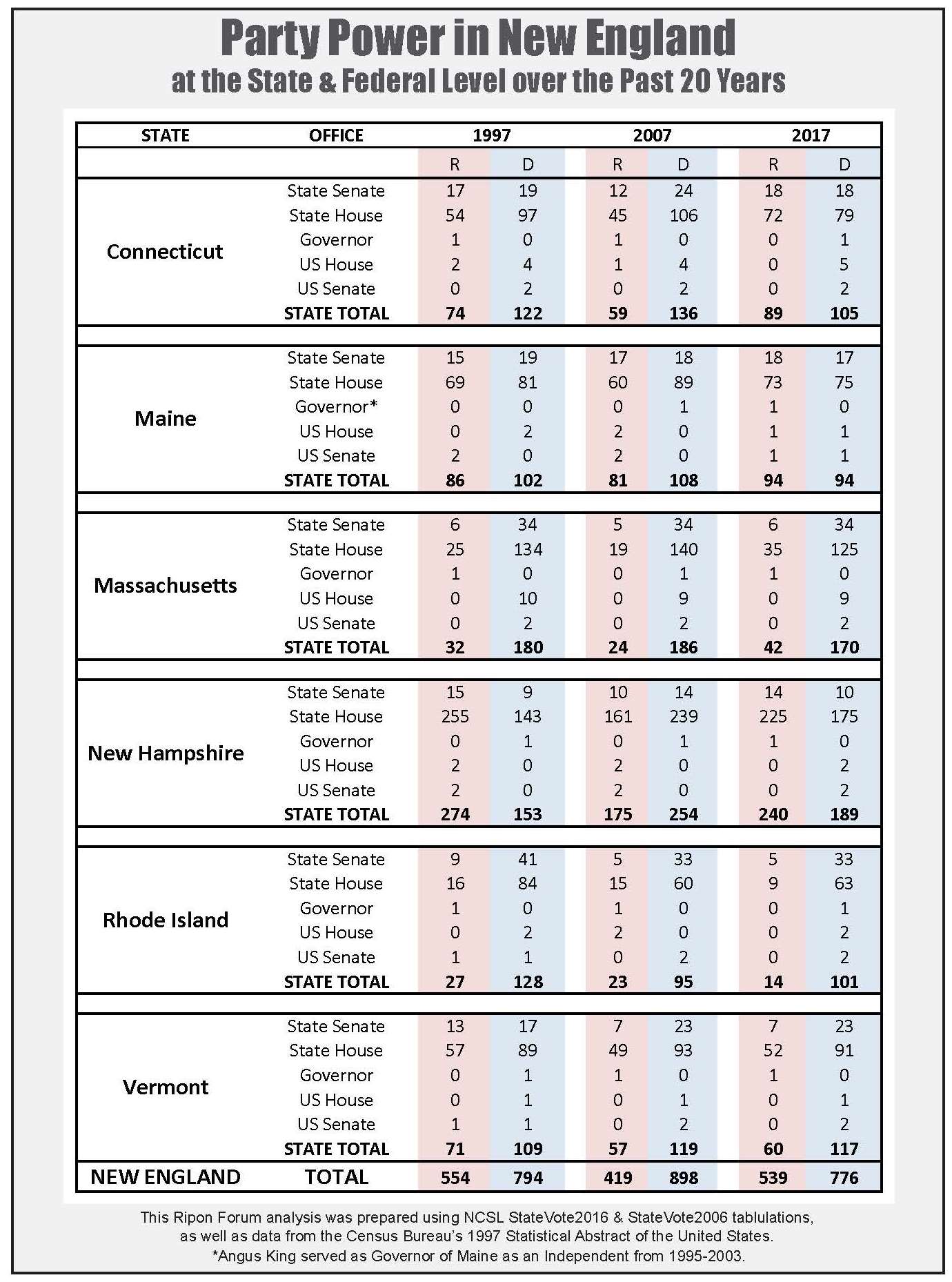
New England is often described as a solidly Democrat region. When one looks at the numbers, it is easy to see why. Only one of New England’s 33 congressional seats is held by a Republican, and Democrats control eight of the 12 state legislative chambers. And yet as a result of last November’s general election, Republicans now serve as governors in four of the six New England states — Maine, Massachusetts, New Hampshire and Vermont.
While nobody can predict the future, all signs suggest that the 2018 gubernatorial races in both Connecticut and Rhode Island are eminently winnable. The ascendency of New England’s Republican governors has not gone unnoticed. A recent article in the Washington Post was headlined, “Governors lead a Republican renaissance in New England”. The question facing Republicans in the region is whether GOP victories at the gubernatorial level can usher in a new political order at other levels of government, as well.
Political success will require many things. Rather than talking about the economy in broad terms, for example, GOP governors must be ready to focus on specifics that place state government on the side of both working families and small business. Rather than being critical of social programs, Republican governors must lead and promote those that foster work, opportunity and self-sufficiency. Rather than imposing state mandates, Republican governors must deliver services based on the principles of choice and devolving responsibilities to communities. Finally, New England’s GOP governors must contrast their “fix it” solutions for failing schools, unsafe streets, economic stagnation, over-taxation, costly regulation and cronyism to the Democrat’s identity politics and liberal overreach.
If there was ever a time to make these changes, it is now. Indeed, the economic dogmas of the New Deal have been insufficient in addressing the economic concerns of working families, recent graduates, and small businesses in New England today. From the rise of technology to the impact of globalization to the decline of manufacturing, the region has found itself lagging behind the rest of the country in its ability to compete. A report released last month by the non-partisan New England Economic Partnership reflected this, finding that the region’s overall growth is expected to drop below the national average, and the region’s employment growth is expected to be below national employment growth through 2018.
The question facing Republicans in the region is whether GOP victories at the gubernatorial level can usher in a new political order at other levels of government, as well.
In light of these failures, it is not enough for Republicans to merely point out how Democratic policies have come up short. Instead, voters must be convinced that GOP initiatives can work and make a real difference in their lives. Massachusetts Governor Charlie Baker summed the situation up this way in an interview with the Washington Post: “Our job is to focus on what matters most to people. Is my neighborhood safe? Do I have a good job? Are the schools I send my kids to going to prepare them for the future.”
Maine GOP Chairman Richard Bennett agreed, saying that, “Republican governors are successful candidates when they roll up their sleeves and propose practical ways to fix things and not focus on ideology.” Put another way, Republicans win when they are viewed as “can do” problem solvers who are addressing the needs of the people, rather than the needs of elites, cronies and special interests.
To achieve this moving forward, GOP governors and gubernatorial candidates should adhere to the following fundamental best practices:
First, set a few key priorities and try not to be all things to all people. The National Governors Association advises “that success in the governorship depends first and foremost on focus.” The focal point must be a strategy to make the most productive use of people, capital and natural resources. States compete to have the most productive environment to keep and grow jobs.
Second, gain control of the center. A governor’s effectiveness depends on the cooperation and goodwill of others. As Governor Baker said in that same interview, “If you’re going to get into a debate or an argument, be soft on the people and hard on the issue.” To accomplish things, it is essential to establish a good working relationship with the legislature. Conflicts are inevitable in partisan politics. How a governor manages these conflicts and controls the center can determine if his or her agenda is enacted.
Third, make effective use of the bully pulpit to mold opinion needed to garner public support for making tough decisions. What a governor can do, that no other state leader can do as well, is to tell the people where the state is, where it needs to be, and when it gets there. One of the most important powers a governor has in that regard is the power of communications. Effective and direct communication is critical, and broad popular support is essential to make the fundamental structural reforms that special interests and their legislative allies have long opposed.
Fourth, understand that good policy and good politics are linked. To achieve sustainable political success, New England GOP governors have an important role to play in party building. Voters will support Republican ideas if the party recruits excellent candidates, gets the message out and has the organization and resources to win the battle of ideas. In a 2006 essay in The Ripon Forum, then-Mississippi Governor Haley Barbour wrote that voters do not get involved with political parties and elections because of the delight of knocking on doors and raising money. They engage and support candidates who will propose and implement programs to help their families prosper consistent with their values.
It is problematic to predict the outcome of elections. However, if New England’s Republican governors can make a lasting difference in the economic and social well being of their citizens, then we may in fact witness a revival of a strong two-party system in New England. And perhaps someday soon, blue New England will turn red.
Gary Sasse is the Founding Director of the Hassenfeld Institute for Public Leadership at Bryant University. Previously, he served as Director of the Rhode Island Department of Administration and Department of Revenue. From 1997 to 2007, he served as Executive Director for the Rhode Island Public Expenditure Council, a public policy research organization.





